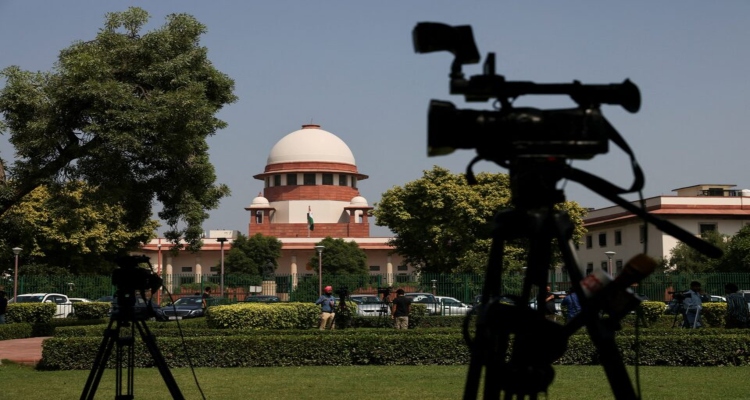
The Government of India has submitted an affidavit to the Supreme Court opposing a petition seeking a lifetime disqualification for convicted politicians, asserting that such a measure falls exclusively within Parliament’s legislative authority.
The Centre contends that judicial intervention in this domain would constitute an unconstitutional encroachment upon legislative prerogatives.
“The question of whether a lifetime ban is appropriate falls exclusively within the legislative purview of Parliament,” the affidavit asserts.
The government emphasizes that imposing time-bound disqualifications upholds a balance between deterrence and proportionality, thereby avoiding excessive penalization. It further argues that the legal principle of limiting penalties temporally is well established and does not inherently contravene constitutional provisions.
“The issues raised by the petitioner have wide-ranging ramifications and clearly fall within the domain of legislative policy. Consequently, the scope of judicial review in such matters is inherently constrained,” the affidavit states.
The petition, filed by advocate Ashwini Kumar Upadhyay, not only seeks a lifetime ban on convicted politicians but also calls for the expedited adjudication of criminal cases involving Members of Parliament (MPs) and Members of Legislative Assemblies (MLAs).
The Centre underscores that judicial precedents have consistently affirmed the principle that courts should refrain from intervening in legislative policymaking based on subjective assessments of efficacy. It references Section 8(1) of the Representation of the People Act, 1951, which prescribes a six-year disqualification period from the date of conviction, or in cases involving imprisonment, from the date of release.
“The disqualifications prescribed under the impugned provisions are subject to temporal limitations as a matter of legislative policy. It would be inappropriate to supplant this legislative determination with the petitioner’s interpretation and impose a lifetime ban,” the affidavit contends.
Additionally, the government asserts that while the judiciary possesses the authority to assess the constitutionality of statutory provisions, it lacks the jurisdiction to alter legislative frameworks to mandate permanent disqualification. The affidavit emphasizes that the prerogative to impose a lifetime ban rests exclusively with Parliament.
“The existence of legislative power does not necessitate its exercise in every instance,” the Centre argues.
Defending the constitutional validity of the existing statutory framework, the government rejects claims of excessive delegation or legislative overreach. It highlights that legislative determinations regarding punitive measures are guided by the principles of proportionality and reasonableness, as reflected in the Bharatiya Nyaya Sanhita, 2023, and other statutory frameworks.
The affidavit further delineates the distinction between the basis for disqualification and its duration.
“It is true that disqualification is triggered by conviction, and this basis remains unchanged as long as the conviction stands. However, the effect of such conviction endures only for a statutorily prescribed period. As previously stated, there is nothing inherently unconstitutional about imposing time-bound limitations on penalties,” it elaborates.
The Centre rebuts the petitioner’s reliance on Articles 102 and 191 of the Constitution, which outline the criteria for disqualification of members of Parliament and state legislatures. It clarifies that Clause (e) of these articles empowers Parliament to legislate on disqualification grounds. The Representation of the People Act, 1951, was enacted pursuant to this constitutional mandate, defining both the conditions and duration of disqualification.
“The Constitution vests Parliament with the authority to enact further legislation governing disqualifications as deemed necessary. Parliament retains the discretion to determine both the grounds and the duration of disqualification,” the affidavit states.
The government also highlights that other constitutional grounds for disqualification—such as holding an office of profit, mental incapacity, insolvency, and loss of Indian citizenship—are not permanent in nature.
On February 10, the Supreme Court sought responses from the Central Government and the Election Commission regarding the constitutional validity of Sections 8 and 9 of the Representation of the People Act, indicating a broader judicial examination of the issue.
Read More: Supreme Court, Delhi High Court, States High Court, International




